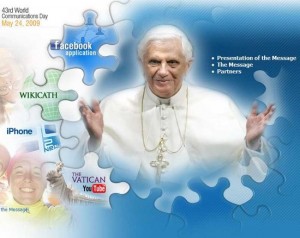Like me, do you ever feel a little guilty about staying up late on Facebook or your own blog site, even though you’re doing it with the good intention of spreading the Gospel message? Do you fear the guilt of clicking away, as the clock reminds you that you aren’t paying enough attention to loved ones–that you probably should be praying? And the cyber-questions that your comments and postings create: Who is seeing what I write? Does anyone out there care? Am I helping to change the world, as I initially had hoped? –Those questions may never find their answers, at least in this life. But to those whom God is inspiring to sit in front of the computer for His sake, despite the development of bad posture, dry eyes, and carpel tunnel syndrome, keep the faith, for the Pope himself has given you his wholehearted blessing.
In today’s address on the occasion of the 45th World Day of Social Communications, Pope Benedict XVI encourages Christians to join the rapidly growing ranks and developments in communications technology, particularly the internet. He doesn’t use the internet himself, but in his message, Truth, Proclamation and Authenticity of Life in the Digital Age, he writes:
“I would like then to invite Christians, confidently and with an informed and responsible creativity, to join the network of relationships which the digital era has made possible. This is not simply to satisfy the desire to be present, but because this network is an integral part of human life. The web is contributing to the development of new and more complex intellectual and spiritual horizons, new forms of shared awareness. In this field too we are called to proclaim our faith that Christ is God, the Saviour of humanity and of history, the one in whom all things find their fulfilment (cf. Eph 1:10). The proclamation of the Gospel requires a communication which is at once respectful and sensitive, which stimulates the heart and moves the conscience; one which reflects the example of the risen Jesus when he joined the disciples on the way to Emmaus (cf. Lk 24:13-35). By his approach to them, his dialogue with them, his way of gently drawing forth what was in their heart, they were led gradually to an understanding of the mystery.”
The Pope also acknowledges some of the dangers involved: “. . . the one-sidedness of the interaction, the tendency to communicate only some parts of one’s interior world, the risk of constructing a false image of oneself, which can become a form of self-indulgence.”




 A new Medjugorje book! OF MEN AND MARY: How Six Men Won the Greatest Battle of Their Lives. Endorsed by Fr. Donald Calloway and Fr. Gary Thomas.
A new Medjugorje book! OF MEN AND MARY: How Six Men Won the Greatest Battle of Their Lives. Endorsed by Fr. Donald Calloway and Fr. Gary Thomas. The Medjugorje book, Full of Grace: Miraculous Stories of Healing and Conversion through Mary's Intercession. Endorsed by Wayne Weible, with a foreword by Fr. Robert Faricy.
The Medjugorje book, Full of Grace: Miraculous Stories of Healing and Conversion through Mary's Intercession. Endorsed by Wayne Weible, with a foreword by Fr. Robert Faricy.